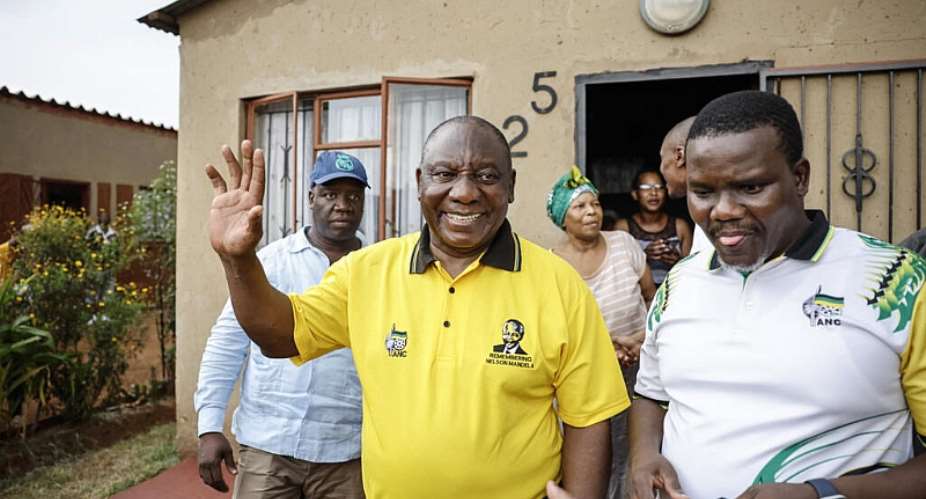South Africans will go to polls on Friday 29 May to elect a new National Assembly, which will then choose the next president. The ruling African National Congress (ANC) is betting on retaining its parliamentary majority but faces the biggest challenge since it came to power in 1994.
Voters say they are disappointed with poor service delivery, unemployment, crime and power cuts.
Pollsters expect the ANC to lose its legislative majority for the first time since Nelson Mandela took power at the end of apartheid 30 years ago.
If this happened, President Cyril Ramaphosa – or an ANC successor for the top job – would be unable to stay on without a coalition, since South Africa's parliament elects the president.
The campaign has already started, and Ramaphosa is travelling nationwide to meet with voters.
On Monday, South Africa's second most popular party, the Democratic Alliance (DA), said that it would not rule out a deal with the African National Congress should the ANC fail to get the majority it needs to retain power in May elections, according to its leader.
"It would depend on which ANC you're dealing with and what their programme of action is," DA leader John Steenhuisen said, declining to disclose whether any talks had already taken place.
"I'm not ruling out anything, depending on what the election results are," Steenhuisen added.
Negotiations
Earlier this month, the ANC's Deputy Party Secretary Nomvula Mokonyane said the party was not considering a coalition government with other parties, and that she was not thinking that a power sharing deal would work.
But it now seems that alliances will be inevitable.
Meanwhile, the DA has been banding together with smaller parties to capture more than 50 percent of the vote needed to take power.
These include the Zulu nationalist Inkatha Freedom Party, a long bitter rival of the ANC, as well as Freedom Front Plus, which appeals to rural white South Africans who feel politically marginalised since the fall of apartheid, and Action SA, which has built a platform on a tough anti-immigration stance and appeals to working and middle class voters.
"It's a long shot," Steenhuisen said.
He added that if the opposition coalition did not win, his priority would be to prevent the Marxist Economic Freedom Fighters (EFF) from getting a seat on the executive.
"What I call the doomsday coalition is a tie up between the EFF and the ANC," he said.
The DA is seen as a pro-business party, whereas businesses and wealthy individuals dislike the EFF, which is popular with poor and Black South Africans.
The EFF promises to nationalise industries and fix inequalities in land ownership.
"I won't sit back and just watch the country handed over to the radical socialists," Steenhuisen said.
"If the [opposition coalition] doesn't get over the line, we may have to look at the least worst option."
If in power, the DA would seek to pursue its policy of privatising the power sector rather than rely on state provider Eskom and eliminating red tape to make it easier for the private sector to operate, Steenhuisen said.
He also reiterated the DA policy of abandoning the ANC's flagship Black Economic Empowerment scheme, which he called "racial bean counting", in favour of one focused solely on reducing poverty, regardless of skin colour.
Race is a divisive issue in South Africa, and the DA is still seen by many as the party of white privilege.
Tarnished image
As its 30th anniversary approaches, the ANC's image appears tarnished by the economic stagnation of the past decade, rising unemployment and repeated corruption scandals involving its top officials.
- Hundreds arrested at opposition rallies against economic plight of South Africa
South Africa's scandal-hit Ramaphosa re-elected as ANC leader
The party in power will have to make compromises.
Mokonyane added it was open to working with anyone as long as they agreed on "the task at hand".
Analysts say losing its majority might jolt the party to do better on service delivery, expand the economy and address other ills like crime and corruption.
But coalitions could also end up being fractious and impede already poor service delivery.
Thirty years after the end of white minority rule, more than 30 percent of South Africans are unemployed, the murder rate is rising, and income inequality is among the highest in the world.
"We are quite certain that with our challenges and imperfections, those happened because we're doing something that was never done," said Mokonyane.
She criticised foreign ownership of land and mineral resources and said the ANC would do more to put national interests, as well as social welfare and girls' education, first.
"The inequality that we see, it's very stubborn," she said.
"We've tried to turn it around, and 30 years is not a [long] enough period to turn things around."
(with Reuters)





 Court dismisses Serwaa Amihere case against Henry Fitz, two others
Court dismisses Serwaa Amihere case against Henry Fitz, two others
 Stolen BRVs: Bi-partisan parliamentary probe non-negotiable — Dr. Omane Boamah
Stolen BRVs: Bi-partisan parliamentary probe non-negotiable — Dr. Omane Boamah
 Bawumia begins regional campaign tour on Monday
Bawumia begins regional campaign tour on Monday
 With great urgency backed by verifiable data, facts and figures dismiss COCOBOD,...
With great urgency backed by verifiable data, facts and figures dismiss COCOBOD,...
 EC’s statement on obsolete BVDs discovery “lies, half-truths, pure fantasies” – ...
EC’s statement on obsolete BVDs discovery “lies, half-truths, pure fantasies” – ...
 Nalerigu court impound vehicles of DCE, Director of Chereponi district for owing...
Nalerigu court impound vehicles of DCE, Director of Chereponi district for owing...
 Cop, 7 others grabbed over $523,000 Gold Scam
Cop, 7 others grabbed over $523,000 Gold Scam
 Akufo-Addo’s driver wins Dadekotopon NPP Parliamentary Primary
Akufo-Addo’s driver wins Dadekotopon NPP Parliamentary Primary
 Investigate, jail persons liable for GRA-SML contract – Manasseh
Investigate, jail persons liable for GRA-SML contract – Manasseh
 Lawyer wins Akan NPP Parliamentary Candidate primary
Lawyer wins Akan NPP Parliamentary Candidate primary
